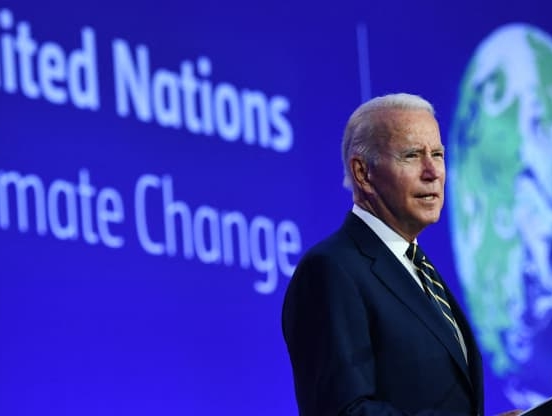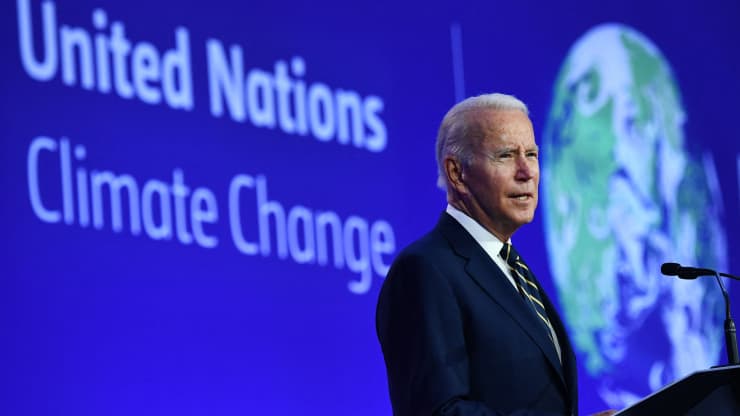Climate, Health and Equity Brief
Climate Action at Home and Abroad
November 9, 2021

The Climate, Health & Equity Brief is GMMB’s take on the week’s news on the current impacts of climate change. If you haven’t subscribed yet, you can do so by clicking here.
Hot Topic: Progress. The first week of the 26th United Nations Climate Change Conference of the Parties (COP26) produced a host of announcements from world leaders pledging to take action on the climate crisis, the most significant of which included the following:
- More than 100 countries—home to 85 percent of the world’s forests—agreed to end deforestation by 2030. This includes Brazil, home to 60 percent of the Amazon rainforest, which has seen dramatic increases in deforestation since 2019 when right-wing President Jair Bolsonaro took office; many fear he will not uphold this commitment.
- Led by the US and EU, more than 100 countries also pledged to cut methane emissions—which have 80 times the warming power of CO2 in the short-term—by at least 30 percent by 2030.
- More than 40 countries agreed to end all investment in new coal power generation domestically and internationally and to phase out coal power in the 2030s (major economies) or 2040s (developing nations). Unfortunately, China, India, and the U.S.—the world’s top coal producers, which together were responsible for more than 70 percent of global coal consumption in 2020—did not join the agreement.
- Prime Minister Narendra Modi surprised many with his pledge that India—the world’s third-largest emitter of fossil fuels—would reach net-zero emissions by 2070, with incremental, measurable targets by 2030. The 2070 pledge is 20 years later than the global goal set by the IPCC, but is still considered ambitious for a country that generates 80 percent of its energy from fossil fuels and is simultaneously working to lift much of its population out of poverty.
While COP26 has produced “more climate ambition than the world has ever seen,” there is no question that much work lies ahead, and could be upended by, among other things, political shifts in key countries including the United States. Scientists estimate that the commitments made thus far—if they are fulfilled, which is a big if—could limit planetary warming to 1.8°C (3.5°F), which is still higher than the upper limit of 1.5°C scientists say is necessary to avoid the worst impacts of the climate crisis. Still, the commitments are something to celebrate, and signal that much of the world could finally be primed to tackle humanity’s greatest threat.
In his COP26 remarks, Joe Biden promised world leaders that the U.S. would lead by example. That commitment took an initial step forward late Friday when the House passed a $1 trillion infrastructure bill that included $47 billion to help communities prepare for climate-fueled fires, floods, storms and droughts. It also includes $7.5 billion for the first U.S. network of electric-vehicle chargers, $5 billion for zero-emission buses, and $65 billion to upgrade U.S. electricity grids, including funds for environmentally friendly smart-grid technology. The Build Back Better Act, a far larger spending bill that includes an additional $550 billion in climate programs, remains in limbo on Capitol Hill, with President Biden signaling his hopes for passage by the week of November 15.
— Matt & Traci, GMMB
Action
More than 100 countries have joined the U.S.- and EU-led pledge to cut methane emissions 30 percent by 2030 compared to 2020 levels, potentially reducing expected warming by 0.3°C (0.5°F) by 2040. (BBC)
More than 100 global leaders—whose nations contain 85 percent of the world’s forests—committed to end deforestation by 2030, a move that will reduce the 23 percent of global emissions from land use activity and preserve the planet’s ability to sequester carbon. (The Washington Post)
More than 40 countries have agreed to end their use of coal-fired power by 2040, including some by 2030, in a major effort to phase out the use of the planet’s dirtiest fuel source. (The Guardian)
India pledged to reach net-zero emissions by 2070, a major and unexpected commitment from the world’s third-largest emitter. (Bloomberg)
Twenty countries including the U.S., U.K., Canada, Italy, Switzerland and New Zealand committed to discontinue approximately $18 billion in annual financing for international fossil fuel projects by the end of 2022, the first time ever such a commitment has included oil and gas projects. (CNN)
G20 leaders agreed to end financing for foreign coal power plant projects, though many had hoped for greater commitments from the world’s top economies to reduce their domestic use of fossil fuels. (The New York Times)
In a first-of-its-kind deal, more than 450 of the world’s largest banks, investors, insurers, and financial regulators committed to incorporating carbon emissions in decision-making, estimating they will generate $100 trillion in funding for new clean technologies through 2050. (The Wall Street Journal)
Forty countries, including the U.S., U.K., China, India, Australia and the EU, committed to coordinating investments in and aligning standards for new clean technologies in electricity, electric vehicles, green steel, hydrogen and sustainable farming to rapidly make them affordable and available by 2030. (The Guardian)
The U.S. House of Representatives passed a $1 trillion infrastructure bill that includes $47 billion to help communities prepare for extreme fires, floods, storms and droughts, marking the first major U.S. investment in climate resilience measures. (The New York Times)
Human Health
A new report warns that without rapid greenhouse gas reductions, about one in three people worldwide could be exposed to temperatures on par with the hottest parts of the Sahara Desert by 2070. (Financial Times)
A new study found that two million annual premature deaths from fine-particle pollution are tied to the consumption habits of the world’s 20 largest economies, with the majority of deaths occurring in developing countries that contain a disproportionate number of polluting factories. (The Washington Post)
If working apart we are a force powerful enough to destabilize our planet, surely working together, we are powerful enought to save it.”
-Sir David Attenborough
Planetary Health
Researchers say the pledges that have been made at COP26 would limit planetary warming to 1.9°C (3.4°F), the first time the world has been on such a path. (The Guardian)
As the atmospheric concentration of carbon dioxide—the biggest driver of planetary heating—continues to rise, the UN World Meteorological Organization projects that 2021 will be one of the seven hottest years in history, all of which have occured since 2015. (Bloomberg)
A new study revealed that climate change is the main driver of extreme wildfire activity across the western U.S., with up to 88 percent of blazes between 1979 and 2020 attributable to climate-fueled drought. (Los Angeles Times)
A newly released Global Carbon Budget report warns that if fossil fuel emissions continue at their current rate, the world will begin to face the most catastrophic impacts of climate change in just 11 years. (The Washington Post)
Equity
Top officials are drawing attention to the need for more women in the climate debate, noting that women are likely to experience more effects of climate change, yet make up less than 30 percent of climate and biodiversity scientists, 12 percent of national environment ministers and only 38 percent of national delegates at COP26. (Bloomberg)
Kicker
Curious about which countries are on track to meet their pre-COP26 climate pledges? Check out this tracker to find out.
The GMMB Climate, Health & Equity Brief would not be possible without the contributions of the larger GMMB California team—Aaron Benavides, Elke Cortes and Stefana Simonetto. Feedback on the Brief is welcome and encouraged and should be sent to CHandEBrief@gmmb.com.






